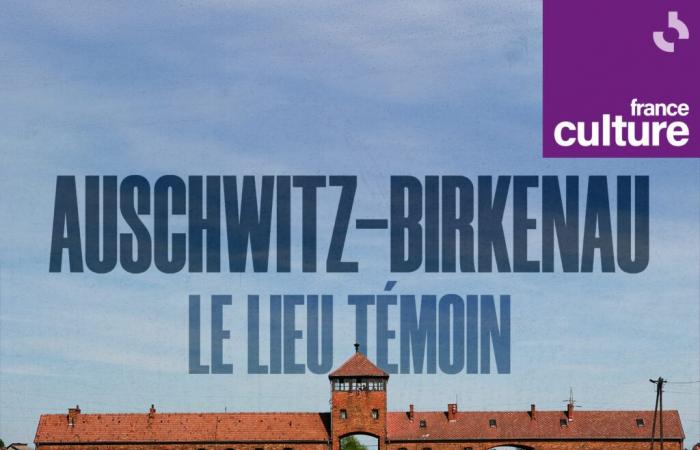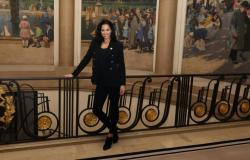
France Culture contributes to the work of memory by giving voice to witnesses and historians through new documentaries et special shows. The opportunity to (re)discover great texts Elie Wiesel and Primo Levi as well as archives to commemorate the 80th anniversary of the liberation ofu camp d’Auschwitz-Birkenau January 27 [1945.
Monday January 27, France Culture is mobilizing to make the transmission of memory heard with two special broadcasts:
Mornings by Guillaume Erner, from 6:30 a.m. to 9 a.m.
With the historian Laurent Joly (The knowledge of victims, Grasset) and the director and screenwriter David Teboul(The girls of Birkenau, a France Télévisions documentary)
Evening questions by Quentin Lafay, from 6 p.m. to 7:30 p.m.
The debate : Is the transmission of the memory of the Shoah being lost? With historians Alexandre Bande et Pierre Jérôme Biscarat
The idea : 80th anniversary of the liberation of the Auschwitz-Birkenau camp: with Tal Bruttmannthe story
LSD, the documentary series : Auschwitz-Birkenau, the witness place – From Polish memory to European history
Four one-hour episodes of Beatrice Lecamade by Yaël Mandelbaumbroadcast from January 27 to 30 at 5 p.m.
Auschwitz is the largest cemetery for Jews and Gypsies in Europe. Catholic Poles, political prisoners, also died there. From 1947, Poland made this place the museum of the “martyr of the Polish nation and other nations” but it would be necessary to wait forty years for the museum to do justice to the Jews and Gypsies. Even today, the Auschwitz-Birkenau museum constitutes a major political issue, in a Poland where the far right, in power from 2015 to 2023, remains powerful.
Episode 1 – 1947-1968: a Polish and communist memorial
Episode 2 – 1969-1989: a Polish and Catholic memorial
Episode 3 – 1990-2005: the memorial to the Jews and Gypsies
Episode 4 – 2006-2025: a universal memorial
A special story: The last word
Two 30-minute episodes ofAlain Lewkowiczmade by Guillaume Baldybroadcast on January 25 and 26 at 1:30 p.m.
This is the story of these last clandestine words and these letters often subject to censorship. Deportees give news or say goodbye, giving their final instructions in gentle and caring writing, with reassuring words, full of affection and love. These last words, those of a father, a mother or a child are so many traces of joy, hatred and the infinite misery of Men. Tons of paper arriving as if by miracle to their recipients and which have stood the test of time. The support has yellowed but these letters which have survived are witnesses of a humanity which has never been lost.
Episode 1: Writing to cheat death
Episode 2: Thus the ghosts wrote
A whole life : Jean Cayrol (1910-2005), a poet in resistance
a one-hour documentary Capucine rushes directed by Angelique Tibau,
broadcast January 26 at 5 p.m.
Jean Cayrol is a former resistance fighter and deportee. While participating in Colonel Rémy's Notre-Dame network, he was denounced by a friend, interned in Fresnes prison, then sent in March 1943 to the Mathausen-Gusen camp. He survives thanks to the help of his comrades, Fathers Gruber and Jacques, and his reading of The Penal Colony by Kafka. But, also undoubtedly, because he never stops being a poet even in Hell. He, who devoted himself to writing at a very young age and who founded a poetry magazine at 16, continues to write poems in appalling conditions, hidden under the table in a workshop.
With in particular Didier Decoinfrom the Académie Goncourt, writer and screenwriter, Erik Orsena of the French Academy, writer and editor and Marcelin Pleynetpoet, essayist, personal secretary of Jean Cayrol.
-The Experience: The Pianists, the last call or the dangerous liaison
a one-hour immersive sound radio creation workshop Marie Guerinproduced by Gilles Mardirossian, broadcast February 1 at 4 p.m.
An encrypted night in homage to the underground radios “who, in London, were the essential relays of the resistance with Free France. (…) In Morse code, the pianists composed the score of victory.” Readings (archives, transmitted messages…), report sounds (reconstruction of a connection with a period briefcase) and electroacoustic music (waves, morse code, jamming…), we enter into the night of pianists, into their gestures, in the device and in the atmosphere of the clandestine connection documented by the voice of a passionate radio amateur and by the emergence of the archive, which rustles and makes itself heard.
Memory, history and justice: the Barbie trial
reissue of the documentary in 25 one-hour episodes Dominique Missikadirected by Pierrette Perronoavailable from January 27 on franceculture.fr and the Radio France application
This exceptional documentary broadcasts extracts from the trial of Nazi Klaus Barbie, punctuated by comments from various personalities. This trial took place from May 11 to July 4, 1987 before the Assize Court of the Rhône department. It was the first time in France that a man accused of crimes against humanity was tried. After eight weeks of hearing, Klaus Barbie was sentenced to life imprisonment.
I learned everything last night of Jacques Lusseyran andAnne Sibran
Realization : Laure Egoroff
“February 24, 2022: the day after Russia's invasion of Ukraine, a distraught woman writer decides to awaken the memory of Jacques Lusseyran, who died fifty years ago. This blind writer, a great resistance fighter, deported to Buchenwald, was able to go through so many disasters without losing any of his strength of commitment, nor letting go of the thread of joy. It is then that this dialogue begins between the woman of today and the one who learned everything during the night.” Anne Sibran, author
With in particular Audrey Bonnet (narrator), Sylvain Levitte (Jacques Lusseyran adult), Charlie Fabert (Jacques Lusseyran young)
Episode 1: The great initiation
Episode 2: Keep your heart's gaze whatever happens
Episode 3: Stories of life and trust
Episode 4: Transforming poetry into action
Episode 5: Taking care of joy
Night d’Elie Wiesel
5 30-minute episodes directed by Baptiste Guitonread by Micha Lescot
live from the Maison de la Radio et de la Musique from January 27 to 31 at 9 p.m.
Night published by Editions de Minuit in 1958 is the first book by Elie Wiesel, Nobel Peace Prize winner in 1986.
Elie Wiesel was a teenager when in 1944 he was deported with his family to Auschwitz and then to Birkenau. Night is the story of Elie Wiesel's memories: the separation from his mother and his little sister whom he will never see again, the camp where with his father he shares the hunger, the cold, the beatings, the torture and the shame of lose his dignity as a man when he does not respond to his dying father.
Episode 1: The Germans enter Sighet
Episode 2: Deportation
Episode 3 : The Goodbye Camp
Episode 4: God
Episode 5: The death of the father and the liberation
> France Culture goes further:
The Course of History / Xavier Mauduit
[1945Post-warreconstruction
a series in four one-hour episodes available on franceculture.fr and the Radio France application
Returning from the camps, how are the deportees and prisoners received? And on the economic side, what measures are being taken to revive the country? From ruins to barracks, towns were rebuilt and at the time of the Liberation, the arts were in turmoil.
Pages torn from Primo Levi
Director Jacques Taroni, Producer Diane Kolnikoff
Episode 1: The Auschwitz camp
Episode 2: The gestures of survival
Episode 3: The fantastic work of Primo Levi
Episode 4: The influence of Primo Levi on the writers of the Shoah
Episode 5: Memories of deportation friends





